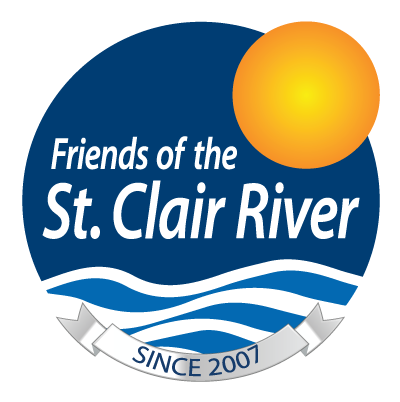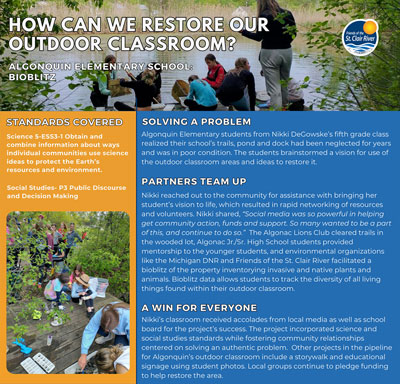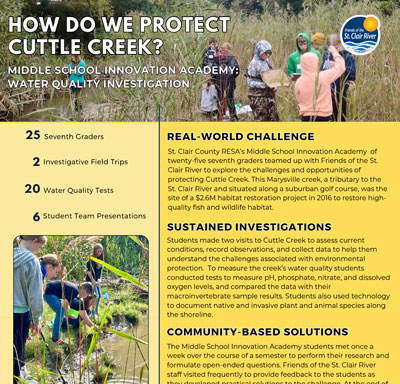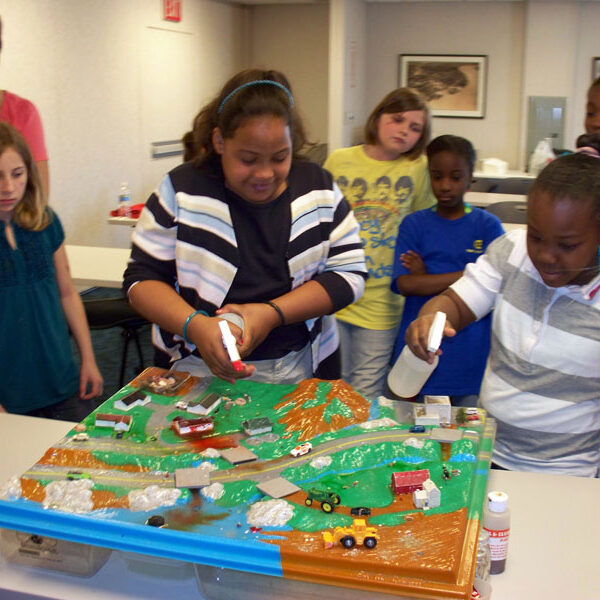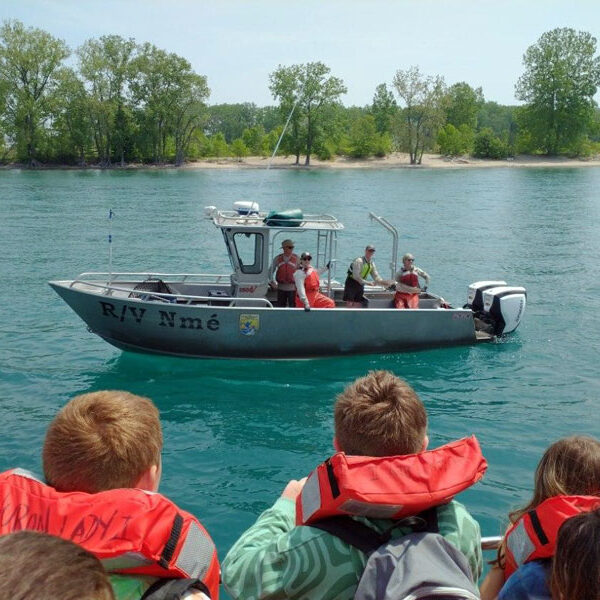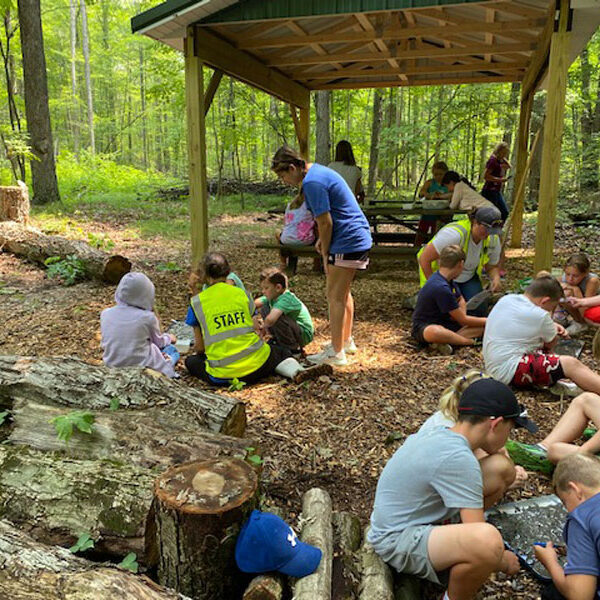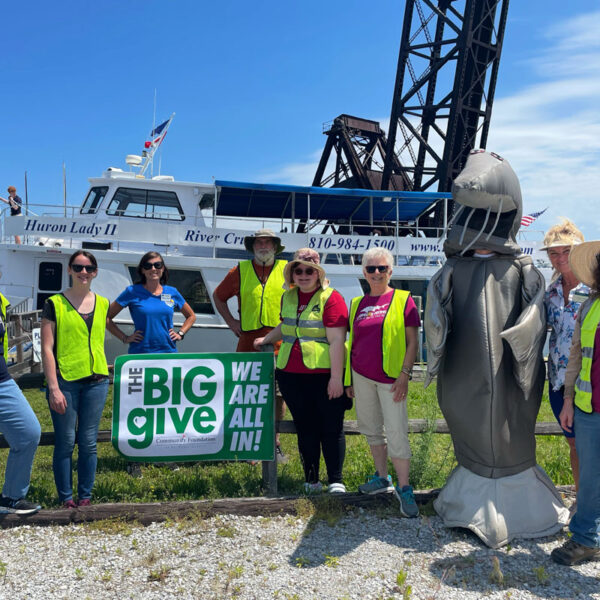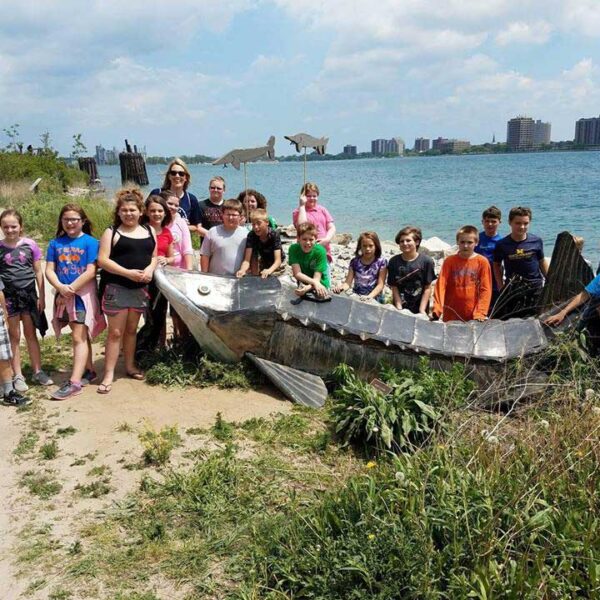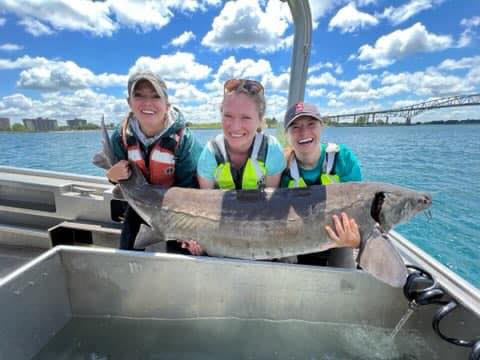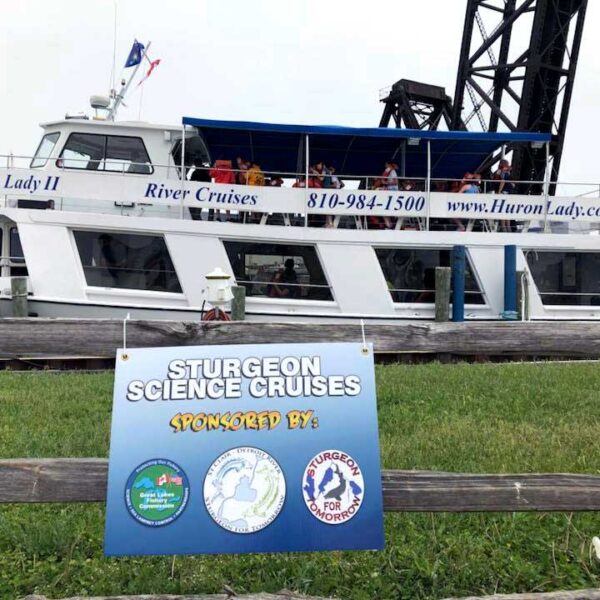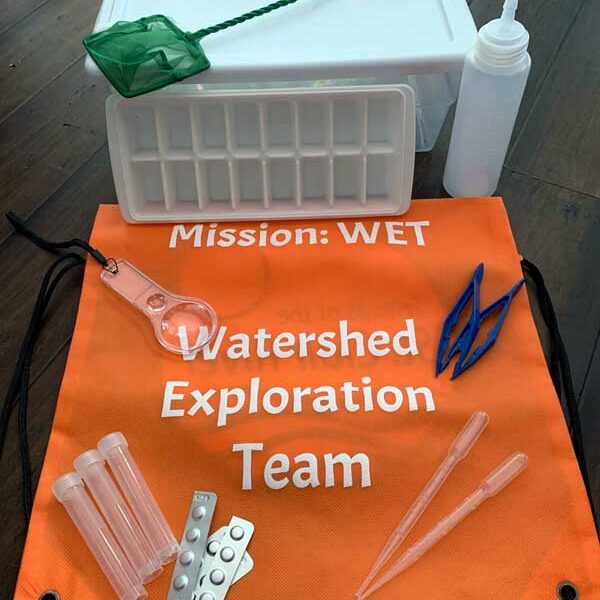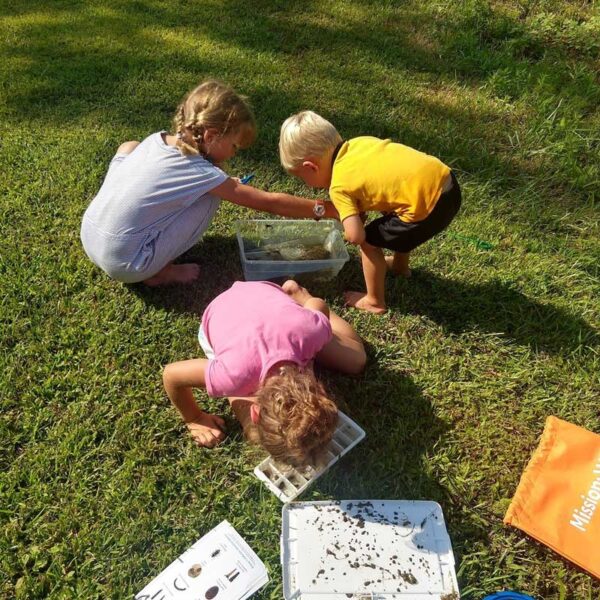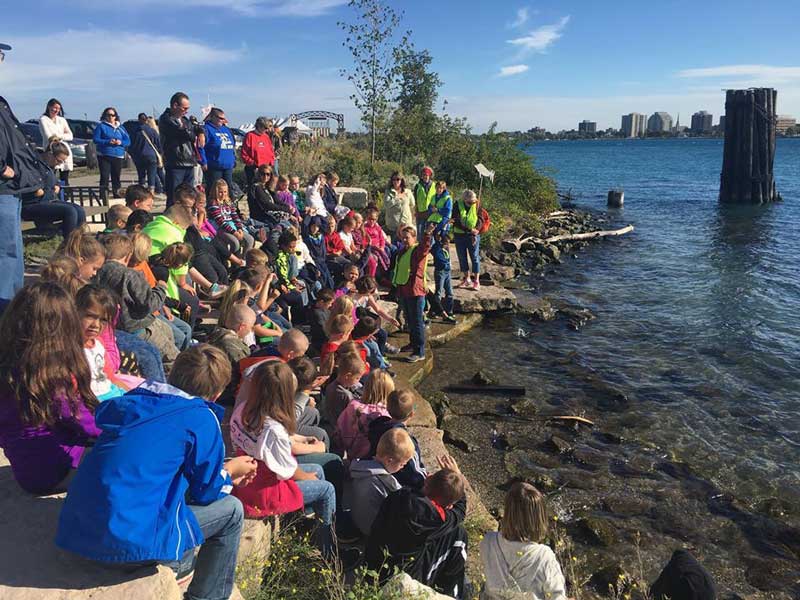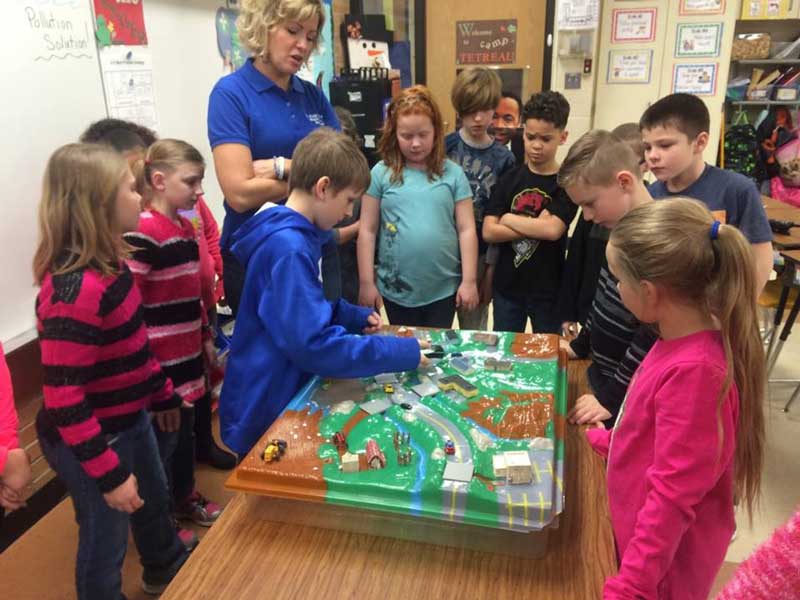Community and Youth Education
Throughout the year we offer workshops and presentations in the classroom and in the field on various environmental topics. Check our Events Page for programs offered year-round.
Contact our Environmental Manager, Melissa Kivel to learn more about these programs or to request a presentation or field trip for your community, school, or youth group.
Grant Opportunity!
Wheels to Woods provides funding to PreK-12 schools and other youth groups to pay for transportation costs for an educational field trip to a nearby forest or nature area. We can suggest interesting areas to visit near your school. Wheels to Woods reimburses actual transportation costs up to $350 per bus and $1,000 per school. Typical grants are about $5 per student. Matching funds are not required.
Place-Based Education Success Stories
At Friends of the St. Clair River, we are offering deeper learning opportunities that foster environmental stewardship and engaged citizenship in formal education settings. We helped facilitate three Place-Based Education (PBE) projects alongside local teachers, including: “How can we protect Cuttle Creek” with St. Clair County RESA Middle School Innovation Academy: “How Can We Restore an Outdoor Classroom” with Algonquin Elementary School in the Algonac School District; and “Communicating Climate Change” with St. Clair Middle School in the East China School District. In these Success Stories, students applied content area knowledge and skills while building community partner relationships and solving authentic problems.
Jump to Program:
Sturgeon Science School
Dive into Great Lakes science
Sturgeon Science School is our unique Placed-Based Education experience that uses the context of our community and natural resources to teach students about human impact on freshwater ecosystems. This free program immerses 5th grade students in hands-on science inquiry and learning that support Next Generation Science Standards and STEM career exposure. During this free, year-long program, 5th grade students learn the story of Michigan's gentle giant, the Lake sturgeon, and its special connection to the St. Clair River. Use problem-solving skills to explore environmental issues, Acquire knowledge about Michigan native and invasive species by gathering and analyzing data, Develop an understanding of the connection between a healthy ecosystem and human impact on the environment. The St. Clair River supports the largest population of threatened Lake sturgeon in the Great Lakes giving St. Clair County students a unique advantage to learn about this Gerat Lakes gentle giant.
Sturgeon Science School includes:
- Classroom visit with our Environmental Educator and our captive-raised live baby lake sturgeon
- 1-hour cruise aboard the Huron Lady sightseeing boat
- Interaction with wildlife biologists conducting sturgeon research on Lake Huron
- Collect, analyze and compare water samples from the St. Clair River
Sturgeon Stories Contest
Cast your vote! Help us catch a keeper
Our Sturgeon Story Contest is a month-long voting competition that uses donations and pocket change to determine the winner our Sturgeon Story Art Contest. People are encouraged go online to cast a vote for their favorite Sturgeon Story and help us catch a keeper.
Since 2012, we have received over 4,000 art submissions from St. Clair County 5th graders sharing their Lake Sturgeon story. Submissions are Visual Art, like drawings and posters, Technical Drawings, like diagrams, timelines and infographics, and Creative Writing like poetry, short stories and original songs. Submissions cover lake sturgeon biology, habitat, their connection to Native Americans, history in the Great Lakes, or how to prevent pollution and keep water clean.
Finalist’s artwork are displayed at Sturgeon Fest where the public votes for their favorite with pocket change. The entry with the most “votes” is the winner. Winners may see their design appear on Sturgeon Fest swag in future years. The money raised during voting is used to provide free Sturgeon Science School for hundreds of area 5th grade students each year.
Mission: WET – Watershed Exploration Team
Since 2007, Friends of the St. Clair River has been evaluating streams and rivers around St. Clair County for a variety of biological, physical and chemical parameters. We have perfected the equipment and procedures to make water quality testing easy, fun and reliable for the public, especially students and families. Our Mission: WET discovery kit was created and field-tested by a team of biologists, educators and children to provide everything you need to begin exploring our watershed.
Mission: WET launched summer 2020 by putting kits in the hands of 25 local families. These families have been let loose to explore the diversity of the landscapes, waterways, ecology and life across St. Clair River’s watersheds and report their results back to us. Training is provided in the form of YouTube videos and an online platform to submit questions and share findings.
Families Kits
Our unique backpack kit is designed for naturalists of any age to delve into the fascinating freshwater world of ponds, creeks, rivers and streams. Aquatic habitats are filled with intriguing life and this backpack is designed to help families explore that diversity together. You’ll collect, observe, sort, and identify aquatic insects as a measurement of healthy water. Search for mayflies, dragonflies, caddisflies, water striders, snails, clams and more!
The Mission: WET kit includes a dip net for collecting insects, tools for sorting organisms, a magnifying lens, professionally-produced procedures, macroinvertebrate identification chart, tests for pH, nitrate, phosphate (using safe, easy TesTabs®), reusable data sheets and supplies to perform five chemical tests.
Teacher Kits
Mission: WET Phase Two is underway to get our kits into school classrooms. The kit complements and enhances classroom curriculum while deepening student’s knowledge of local ecosystems and provides hands-on field experiences. We are working with K-12 educators from school districts around St. Clair County and adjunct instructors at St. Clair County Community College.
Educational objectives of the program include: (1) Expand student awareness of the local environment and their role in the watershed and, (2) Expose students to research techniques used by scientists in the field to assess water quality.
Mission: WET enables students to learn about the importance of aquatic wildlife, to directly contribute to the science of water quality monitoring, and to measure progress on improving and protecting the health of our rivers. Students learn real-life connections between water chemistry, macroinvertebrate communities, and what that means for the overall ecosystem and we obtain real-time data about our rivers and streams.
Blue Water River Walk Field Trips
The Blue Water River Walk serves as a beautiful riverside habitat that’s a haven for wildlife, plants and people. Once an industrial wasteland, this 1-mile St. Clair River shoreline was transformed in 2014 into an accessible waterfront with a paved trail providing native plants, landscaping and habitat for fish and wildlife. This family-friendly Blue Water River Walk Scavenger Hunt will have you using all your senses to discover how people and wildlife use the Blue Water River Walk.
The Blue Water River Walk Self-Guided Tour was created for older students and adults. Download and print this free resource before your next visit to the Blue Water River Walk. This self-guided tour will provide critical thinking opportunities about the impacts people have had on our landscape over the last 500 years.
Pollution Solutions
Pollution Solutions is a free, hands-on presentation that helps students relate the water cycle and pollution sources to their daily lives. Participants “pollute” a miniature watershed model of St. Clair County and then watch the effects of a homemade rainstorm and discuss water quality problems and solutions. Topics covered include the connection between the health of the environment and our everyday actions.
This program is appropriate for 3rd -12th grade classrooms, Boy and Girl Scout groups, fairs, festivals, and summer recreation programs. This program can be done in-person or virtually.
